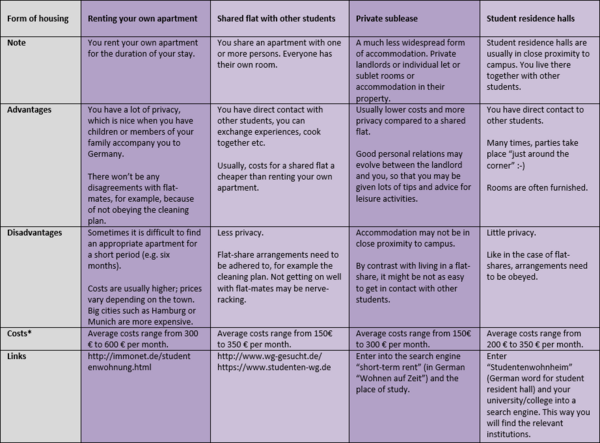Preparing your stay in Germany
Deciding on a university

When it comes to choosing a university, you have many options. There are around 400 universities and colleges in Germany. Under the following link you will find a list of all institutions of higher education in Germany:
https://de.wikipedia.org/wiki/Liste_der_Hochschulen_in_Deutschland
The following criteria can help facilitate your decision:
- Which university offers my field of studies? Which university is highly renowned for my field of studies?
- Do you know any students that have already made the experience of studying in Germany and could advise you in the search?
- The place of study may also be relevant. Are you more attracted by the sea? Then the north (e.g. Kiel) might be right for you. If you prefer mountains, then the south of Germany is the ideal region for studying (e.g. Munich).
And not least you can check with your home university what type of cooperations are established with German universities, and inquire about experiences gained by other students who studied abroad.
All about money

Tuition fees
For studying in Germany, be prepared to pay for the following expenses: travel costs, basic living expenses (rent, living expenses, books and also university costs). All university students in Germany are required to pay a so-called semester contribution, the amount of which can vary depending on the university. General tuition fees no longer exist. Occasionally, there are other forms of tuition fees for students if they have studied for an especially long time (long-term students) or are pursuing a second degree.
Scholarships
In most cases, money is scarce for students so that financial support for the stay abroad is very welcome. International students can apply for scholarships from numerous organizations, for example the DAAD (German Academic Exchange Service). The following links will provide you with further information:
Opening of a bank account
When studying abroad, there is a lot to organize. While studying in Germany, you’ll definitely need a bank account. Students who require a visa need to open a so called ‘blocked account’ with a German bank as a prerequisite for issuance of a visa. A certain amount must be deposited on this blocked account, which is ‘blocked’ in favor of the Federal Republic of Germany; hence the name ‘blocked account’.
You can open a blocked account at the ‘Deutsche Bank’, for example:
https://www.deutsche-bank.de/pk/konto-und-karte/konten-im-ueberblick/internationale-studenten.html
If you are coming from an EU member state, an online account with a German bank or an international bank incorporated in Germany is also suitable.
Your visa

After choosing a university and after receiving the notice of admission, it is important that you submit your student visa application early enough, because visa processing can take several months. Germans love their bureaucracy :-). To do so, please contact the German embassy or the German General Consulate in your home country. Make sure your passport is valid. Furthermore, you need a proof of financial resources that verifies that you can pay for your studies in Germany.
You will find more information under: http://www.auswaertiges-amt.de/DE/Infoservice/FAQ/Studium/Uebersicht.html?nn=383016
Health insurance for your stay

Anyone wanting to study in Germany needs health insurance – without it you won’t be able to enroll in a German university. The organization of the German health insurance system is characterized by the dual system of public health insurance (GKV) and private health insurance (PKV). It is sufficient for students coming from EU member states or from countries with whom Germany has made social insurance agreements, to furnish proof of their local health insurance contract.
If you are under the age of 30 and have not completed 14 subject-related semesters yet, you are compulsorily insured in a statutory health insurance scheme in Germany. Or you can insure privately, for example, through us.
If you are over 30 years of age or have been studying for more than 14 subject-related semesters, you will need to obtain private insurance cover. We will be glad to help you. On our website you will find a short video that provides further information on this topic. Link to the video. For general questions on insurances, please contact us by live chat, e-mail or phone. We will be pleased to assist you.
Finding accommodation

The possibilities of accommodation are varied in Germany. Renting your own apartment? Or rather a subleased room of a private landlord or a single room in a shared flat with other students? Or do you prefer a room in a student hall of residence in close proximity to campus? Each has advantages and disadvantages; you decide what is best for you and, of course, a bit of luck is also necessary to get exactly what you want :-).
The following table provides a brief summary of each housing option:
Some further tips
- Start looking for accommodation in Germany as soon as possible. In some big university towns, finding an affordable place to live is not always easy.
- If you have any questions, contact the student services (Studentenwerk) at your university.
- To avoid any miscalculation, inquire about additional costs such as costs for telephone, internet, heating, electricity etc). Sometimes these costs are included in the monthly rent, and sometimes not.
Your personal checklist for studying in Germany
- Decide on a university, send application and wait for the notification of admission
- Submit your visa application
- Check possible funding opportunities and send application for a scholarship
- Check your insurance cover for your stay abroad (travel health insurance etc)
- Search an accommodation and find a new tenant or subtenant for your current flat
- Open a bank account in Germany
- Book a flight
- Assemble your papers (valid passport, vaccination card etc)
You can download the checklist here as a PDF file:




